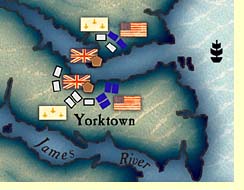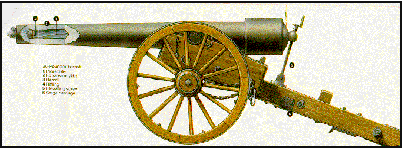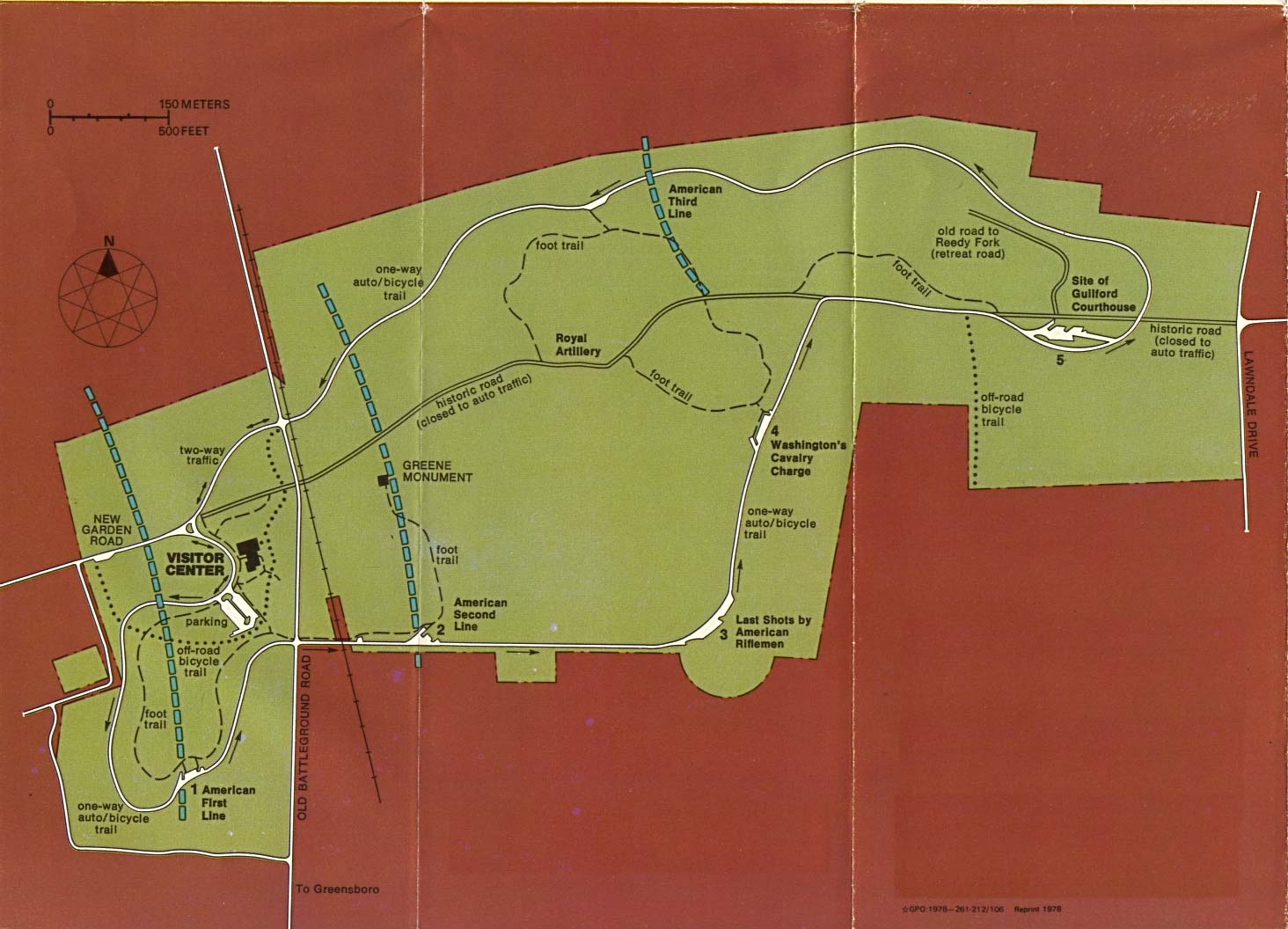Yorktown

Battle of Yorktown — The War’s End
September 1781 – October 19, 1781
MIRACULOUS CONVERGENCE
“The first necessity [of the Yorktown campaign] was to arrange the meeting of French naval and American land forces on the Virginia coast at a specified time and place. The junction in Virginia had to be coordinated by two different national commands separated across an ocean without benefit of telephone, telegraph or wireless. That this was carried out without a fault seems accountable only by a series of miracles.”
Scholar Barbara Tuchman in The First Salute
Moving an army in 18th century America was no easy task. Bridges were nearly non-existent; roads were trails; forage was always inadequate to the needs of thousands of men and animals.

On August 14, 1781, Washington and the French general Rochambeau received word from Comte de Grasse, the admiral of the French fleet, that he would be arriving off the coast of Virginia in mid-September. De Grasse would remain in the Chesapeake area for a month, until the expected seasonal heavy weather forced him south again.
Here was an opportunity to trap Cornwallis in Virginia, but to do so meant that not one, but two armies—one speaking English, one French—would have to travel 500 miles over local roads in a coordinated assault with a navy that was, at the time de Grasse’s letter arrived, sailing somewhere in the Atlantic.
To further complicate matters, the American and French armies would have to leave their encampments in New York in the face of the large British army stationed there. If a whiff of their intentions wafted toward British lines, the British would certainly engage the allied armies.
They broke camp on August 19.
A guard of American militia and Continental regulars was left in New York to cover the Hudson River crossing of the 7,000 French and American troops who were heading south. The crossing was made without incident and the joined armies headed south at a rate of 15 miles a day.
On September 1, they’d reach Philadelphia, 130 miles down the road.
On September 2, British General Henry Clinton in New York learned that Washington and Rochambeau had slipped away and had just passed through Philadelphia, heading toward Cornwallis. He sent word to Virginia that the allies were coming.
On September 5, Washington discovered that de Grasse had arrived early in the Chesapeake with 28 ships and 3,000 troops. A British fleet was also cruising toward the bay.
An advanced force of the Continental Army reached Baltimore on September 12.
On September 16, Washington learned that, after an initial skirmish, the powerful French fleet had intimidated the British fleet away from the Chesapeake. The bay was in French hands.
“On September 28,” Barbara Tuchman writes, “the clink of bridles and the rhythmic clomp of horses’ hooves and tramp of marching men were heard in the British camp in Yorktown, announcing the approach of the enemy army from Williamsburg.”
Yorktown was surrounded. In 3 weeks time, Cornwallis would surrender and the Revolutionary War would be all but over.
The battle of Yorktown began late in September 1781. The British General sent pleas for troop reinforcements and even considered ferrying his men across the river to safety. The French and Americans began a long bombardment, with the French artillery proving highly accurate.
No reinforcements, the continuous bombardment by French and Americans, and a loss of two key redoubts or hilltop fortifications to a night attack led by Washington’s aide de-Camp, Lieutenant Colonel Alexander Hamilton, led Cornwallis to see there was little hope left for his army. He surrenderd to Washington on October 19, 1781. Although is was not yet clear, the war was as good as over.
Surrender at Yorktown
Letters of Gen. Cornwallis and Gen. Washington
Gen. Cornwallis to Gen. Washington, October 17, 1781
I propose a cessation of hostilities for twenty-four hours, and that two officers may be appointed by each side, to meet at Mr. Moore’s house, to settle terms for the surrender of the posts of York and Gloucester.
Gen. Washington to Gen. Cornwallis, October 17, 1781
I have had the Honor of receiving Your Lordship’s Letter of this Date.
An Ardent Desire to spare the further Effusion of Blood, will readily incline me to listen to such Terms for the Surrender of your Posts and Garrisons at York and Gloucester, as are admissible.
I wish previous to the Meeting of Commissioners, that your Lordship’s proposals in writing, may be sent to the American Lines: for which Purpose, a Suspension of Hostilities during two Hours from the Delivery of this Letter will be granted.
Gen. Cornwallis to Gen. Washington, October 17, 1781
I have this moment been honoured with your Excellency’s letter, dated this day.
The time limited for sending my answer will not admit of entering into the detail of articles; but the basis of my proposals will be, that the garrisons of York and Gloucester shall be prisoners of war, with the customary honours. And, for the conveniency of the individuals which I have the honour to command, that the British shall be sent to Britain, and the Germans to Germany, under engagement not to serve against France, America, or their allies, until released or regularly exchanged. That all arms and public stores shall be delivered up to you; but that the usual indulgence of side-arms to officers, and of retaining private property, shall be granted to officers and soldiers, and that the interest of several individuals, in civil capacities and connected with us, shall be attended to.
If your Excellency thinks that a continuance of the suspensions of hostilities will be necessary, to transmit your answer, I shall have no objection to the hour that you may propose.
Gen. Washington to Gen. Cornwallis, October 18, 1781
To avoid unnecessary Discussions and Delays, I shall at Once, in Answer to your Lordship’s Letter of Yesterday, declare the general Basis upon which a Definitive Treaty and Capitulation must take place.
The Garrisons of York and Gloucester, including the Seamen, as you propose, will be received Prisoners of War. The Condition annexed, of sending the British and German Troops to the parts of Europe to which they respectively belong, is inadmissible. Instead of this, they will be marched to such parts of the Country as can most conveniently provide for their Subsistence; and the Benevolent Treatment of Prisoners, which is invariably observed by the Americans, will be extended to them. The same honors will be granted to the Surrendering Army as were granted to the Garrison of Charles town.
The Shipping and Boats in the two Harbours, with all their Guns, Stores, Tackling, Furniture and Apparel, shall be delivered in their present State to an Officer of the Navy, appointed to take possession of them.
The Artillery, Arms, Accoutrements, Military Chest and Public Stores of every Denomination, shall be delivered unimpaired to the Heads of Departments, to which they respectively belong.
The Officers shall be indulged in retaining their Side Arms, and the Officers and Soldiers may preserve their Baggage and Effects, with this Reserve, that Property taken in the Country, will be reclaimed.
With Regard to the Individuals in civil Capacities, whose Interests Your Lordship wishes may be attended to, until they are more particularly described, nothing definitive can be settled.
I have to add, that I expect the Sick and Wounded will be supplied with their own Hospital Stores, and be attended by British Surgeons, particularly charged with the Care of them.
Your Lordship will be pleased to signify your Determination either to accept or reject the Proposals now offered, in the Course of Two Hours from the Delivery of this Letter, that Commissioners may be appointed to digest the Articles of Capitulation, or a Renewal of Hostilities may take place.
Gen. Cornwallis to Gen. Washington, October 18, 1781
I agree to open a treaty of capitulation upon the basis of the garrisons of York and Gloucester, including seamen, being prisoners of war, without annexing the condition of their being sent to Europe; but I expect to receive a compensation in the articles of capitulation for the surrender of Gloucester in its present state of defence.
I shall, in particular, desire, that the Bonetta sloop of war may be left entirely at my disposal, from the hour that the capitulation is signed, to receive an aid-de-camp to carry my dispatches to Sir Henry Clinton. Such soldiers as I may think proper to send as passengers in her, to be manned with fifty men of her own crew, and to be permitted to sail without examination, when my dispatches are ready: engaging, on my part, that the ship shall be brought back and delivered to you, if she escapes the dangers of the sea, that the crew and soldiers shall be accounted for in future exchanges, that she shall carry off no officer without your consent, nor public property of any kind; and I shall likewise desire, that the traders and inhabitants may preserve their property, and that no person may be punished or molested for having joined the British troops.
If you choose to proceed to negociation on these grounds, I shall appoint two field officers of my army to meet two officers from you, at any time and place that you think proper, to digest the articles of capitulation.


